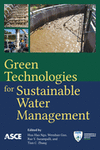Chapter 21
Adapting to Climate Change: Water Management Strategy
Publication: Green Technologies for Sustainable Water Management
Abstract
Impacts of climate change and climatic variability are evident in many parts of the world and will result in significant effects on water resources. Climate change studies inherently have to consider the significance of natural variability, future emissions, and downscaling methodology. Climate change threatens water management through changes in precipitation patterns and agricultural production through variable temperatures, and increased occurrences of extreme events, such as droughts and floods. This chapter presents a case study of Pichola Lake Basin. The objective of the case study is to assess the impact of climate change on a lake basin in an arid region in India for the various Intergovernmental Panel on Climate Change (IPCC) SRES scenarios. Adaptation and mitigation techniques are of immense importance when tackling and eliminating or reducing the adverse effects of climate change to life and property.
Get full access to this article
View all available purchase options and get full access to this chapter.
References
Aggarwal, P. K., et al. (2009a). Agriculture and environment, hand book of agriculture, Directorate of Information and Publication Agriculture, ICAR, New Delhi, 62–92.
Aggarwal, P. K., et al. (2009b). “Introduction.” Global climate change and indian agriculture, P. K. Aggarwal, ed., ICAR, New Delhi, 1–5.
Anandhi, A., Srinivas, V. V., Kumar, D. N., and Nanjundiah, R. S. (2009). “Role of predictors in downscaling surface temperature to river basin in India for IPCC SRES scenarios using support vector machine.” Int. J. Climatol., 29(4), 583–603.
Benoudjit, N., Archambeau, C., Lendasse, A., Lee, J., and Verleysen, M. (2002). “Width optimization of the Gaussian kernels in radial basis function networks.” ESANN’2002 Proc., European Symposium on Artificial Neural Networks Bruges, Belgium, 425–432.
Goldblatt, M., Gelb, S., and Davis, G. (2002). Macroeconomics and sustainable development in Southern Africa, Development Bank of Southern Africa.
Goyal, M. K., and Ojha, C. S. P. (2012). “Downscaling of surface temperature for lake catchment in arid region in India using linear multiple regression and neural networks.” Int. J. Climatol., 32(4), 552–566.
Hardle, W. (1990). Applied nonparametric regression, Cambridge University Press, Cambridge, U.K.
IPCC (Intergovernmental Panel on Climate Change). (2007). “Climate change 2007: The physical science basis.” Contribution of Working Group I to the Fourth Assessment Report of the IPCC, S. Solomon, D. Qin, M. Manning, Z. Chen, M. Marquis, K. B. Averyt, M. Tignor, and H. L. Miller, eds., Cambridge University Press, Cambridge, U.K., 996.
Johnson, M. S., Coon, W. F., Mehta, V. K., Steenhuis, T. S., Brooks, E. S., and Boll, J. (2003). “Application of two hydrologic models with different runoff mechanisms to a hillslope dominated watershed in the northeastern US: A comparison of HSPF and SMR.” J. Hydrol., 284(1-4), 57–76.
Kalnay, E., et al. (1996). “The NCEP/NCAR 40-year reanalysis project.” Bull. Am. Meteorol. Soc., 77(3), 437–471.
Keerthi, S. S., and Lin, C. J. (2003). Asymptotic behaviors of support vector machines with Gaussian kernel.” Neural Comput., 15(7), 1667–1689.
Khobragade, S. D. (2009). “Studies on evaporation from open water surfaces in tropical climate.” Ph.D. thesis, Indian Institute of Technology, Roorkee, India.
Makin, A. (2005). “Desalination in focus.” News Drop, 22(1).
Nadaraya, E. A. (1964). “On estimating regression.” Theory Probab. Appl., 9(1), 141–142.
Nash, J. E., and Sutcliffe, J. V. (1970). “River flow forecasting through conceptual models. Part I—A discussion of principles.” J. Hydrol., 10(3), 282–290.
Nelson, G. C. (2009). “Agriculture and climate change: An agenda for negotiation in Copenhagen.” 〈http://www.ifpri.org/2020/focus/focus16.asp〉 (May 2015).
Pathak, H., Aggarwal, P. K., and Singh, S. D. (2012). “Climate change impact, adaptation and mitigation in agriculture: Methodology for assessment and applications.” Indian Agricultural Research Institute, New Delhi.
Pathak, H., et al. (2003). “Climatic potential and on-farm yield trends of rice and wheat in the Indo-Gangetic plains.” Field Crops Res., 80(3), 223–234.
Yee, P., and Haykin, S. (1993). “Pattern classification as an ill-posed, inverse problem: A reglarization approach.” Proc., IEEE Int. Conf. Acoustics, Speech, Signal Processing, Vol. 1, 597–600.
Zhang, B., and Govindaraju, R. S. (2000). “Prediction of watershed runoff using bayesian concepts and modular neural network.” Water Resour. Res., 36(3), 753–762.
Information & Authors
Information
Published In
Copyright
© 2016 American Society of Civil Engineers.
History
Published online: Jul 1, 2016
ASCE Technical Topics:
Authors
Metrics & Citations
Metrics
Citations
Download citation
If you have the appropriate software installed, you can download article citation data to the citation manager of your choice. Simply select your manager software from the list below and click Download.
